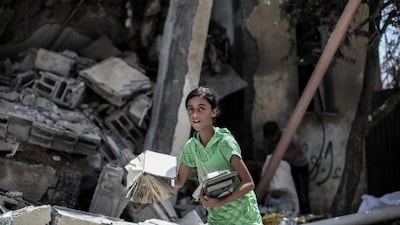Marcello Di Cintio's Pay No Heed to the Rockets is a road trip in search of Palestine's writers. In just a little over 200 pages, Di Cintio introduces us to dozens of writers, each living a different creative life in cities ranging from Ramallah to Haifa to Gaza to Jerusalem.
Di Cintio is fortunate to meet authors as far north as Akka and as far south as Gaza City. While the distance travelled is less than 200 kilometres, it’s a journey most of the writers in the book would be unable to take.
The book's subtitle is "Palestine in the Present Tense", but Di Cintio starts his journey in the past, talking to family and friends of two of Palestine's late and most well-known writers: Mahmoud Darwish and Ghassan Kanafani.
The author’s first stop is Al Birwa, the village where Palestine’s national poet was born. For those familiar with Palestinian literature, there is not much new in the opening chapter. But its stories of expulsion, arrest and assassination set the stage for the rest of Di Cintio’s journey.
After Al Birwa, Di Cintio piles us back in the car and heads for Ramallah, where we meet the young writer Maya Abu-Alhayyat. Born to a Lebanese mother and a Palestine Liberation Organisation father, Abu-Alhayyat was raised in various Arab cities, not moving to Palestine until she was 16. She speaks frankly about the obstacles she's faced as a woman writer. First, she said, she wasn't taken seriously. Later, male writers wanted credit for discovering her. "But mostly the men want you to clap for them."
In proper road-trip fashion, the book features many unplanned encounters, such as when Di Cintio follows Abu-Alhayyat to a Ramallah bar. There, he meets the acclaimed playwright Dalia Taha, who chooses not to talk to him.
Another friend of Abu-Alhayyat's asks Di Cintio how he plans to "avoid being Orientalist" in his book. Part of the charm of Pay No Heed is that he admits he has no answer.
While still in Ramallah, Di Cintio meets Moheeb Barghouti when the author sits at Di Cintio’s cafe table and struggles to repair his glasses with crazy glue.
The book makes little distinction between greater and lesser-known writers, and Di Cintio spends as much time talking about Barghouti-of-the-broken-glasses as about the internationally renowned poet Ghassan Zaqtan.After all, Pay No Heed is less about great literature than it is about writers' lives.
Instead of hearing about Zaqtan's literary style, we hear about his trouble getting visas to travel to the US and Canada. Unsurprisingly, the restrictions put on Palestinian writers and their literature is not the book's only story. Di Cintio meets Sharif Kanaana, whose collection of Palestinian folk tales, Speak Bird Speak, was pulled from school shelves by Hamas. The book also details the banning last year of Abbad Yahya's novel Crime in Ramallah, for which the author also received death threats. Di Cintio doesn't present these moments in a vacuum, but rather with care and context.
From Ramallah, Di Cintio travels to Nablus, where he meets Wisam Rafeedi, who discusses the complex world of writing while in prison. Rafeedi describes how, sometimes, whole books were smuggled out in prisoners’ rectums. While in an Israeli prison, Rafeedi himself wrote a memoir.
During inspections, he tells us, Rafeedi’s fellow prisoners “would fasten his manuscript to a fax [a hunk of bread] and throw it to sections of the camp that weren’t being searched”. But one poor throw meant the manuscript was confiscated and lost for ever.
Pay No Heed also gives us a glimpse of the wider literary ecosystems in and around historic Palestine. Di Cintio talks not just to authors, but also to librarians, publishers, and booksellers.
While in Jerusalem, Di Cintio meets Mahmoud Muna, the proprietor of the Palestine Educational Bookshop, who discusses the difficulties of importing books, and how the demand for Arabic texts has declined at their East Jerusalem location, replaced by an increased demand for English literature, instead.
Di Cintio also visits three young Palestinian writers who have Israeli citizenship – Ala Hlehel, Raji Bathish, and Asmaa Azaizeh – and talks about their complicated creative lives. Hlehel, for instance, was unable to travel to the "Beirut39" gathering after he was named one of the "39 most promising writers under 39". First, he was blocked by Israel, then by Lebanon. Finally – when both had given permission for him to travel – a volcano erupted in Iceland, and his flight was cancelled.
This literary road trip is not without time spent at a number of different checkpoints. When Di Cintio goes to the Erez checkpoint to enter Gaza at 8.30am, he's told it might open at 10am, while it really opens at noon. Yet, once inside, he has the great fortune of meeting writers Atef Abu Saif and Asma Al Ghul.
Here, the book has one of its most poignant moments. It quotes the outspoken feminist journalist Al Ghul as saying she always wanted to write and never wanted to get involved in politics. The author’s voice follows, saying: “I didn’t believe her.”
________________________
Read more:
Book review: 'Warlight' is a shadowy, dimly lit novel of seductive beauty
Book review: Ben White's Cracks in the Wall looks at Israel in isolation
Book review: 'Divided: Why We're Living in an Age of Walls' by Tim Marshall
________________________

